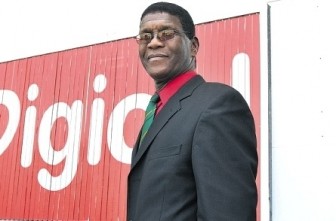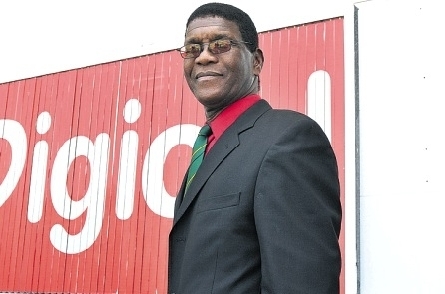(Jamaica Observer) Twenty-eight years after he led two rebel tours of Apartheid-ruled South Africa in contravention of an international ban on sporting activity with that country, former West Indies cricketer Lawrence Rowe apologised yesterday in time for the naming of a pavilion in his honour at Sabina Park in Kingston.
At the same time, Lynden Wright, the new president of the Jamaica Cricket Association (JCA), accepting that his administration erred, said a committee will be set up to decide on the “naming” of sections of Sabina Park “going forward”.

There was consternation in some circles late Sunday when word came via a news release from the JCA that Rowe was among three for whom sections of Sabina Park, Jamaica’s historic headquarters of cricket, was being named.
Rowe led two rebel tours of South Africa in 1982/83 and 1983/84. He and others on those tours were banned from cricket. The bans were lifted in 1989 with the release from prison of Nelson Mandela, and a rapid movement to dismantle the fascist system of apartheid and establish democracy in that country.
In his apology issued yesterday ahead of the Sabina Park ceremony, Rowe said: “It is common knowledge that 28 years ago I led a team of West Indian cricketers on a tour of Apartheid South Africa. South Africa at that time was banned from international cricket because of the Apartheid regime that was in force in the country.
“The tour, which along with other such ones was grouped as the ‘Rebel Tours’, was organised and conducted without the approval of the West Indies Cricket Board of Control. Such tours in fact were outlawed by cricket boards all over the world, by governments, including the Government of Jamaica, by the International Cricket Council and by other international organisations including the United Nations.
“Understandably, the tour offended the people of Jamaica and throughout the cricket playing countries of the Caribbean.
“Today, I sincerely apologise to the cricket fraternity of the Caribbean and the world.”
Under Apartheid, racial segregation was enforced by the Government of South Africa between 1948 and 1990. The majority black population was not allowed to vote, had no role in the Government and was subject to unbridled abuse by agents of the state.
Aside from renaming the Players’ Pavilion the Lawrence Rowe Players’ Pavilion, yesterday’s ceremony saw the naming of the southern end of the ground as the Michael Holding End and the northern section as the Courtney Walsh End.
Addressing the media shortly after the ceremony, Rowe said: “I’m happy that the JCA can bestow this on me. Today is the final death of that tour. It was 28 years ago, and I don’t want to rehash a lot of that sort of situation right now. I want to move forward from now on and what the Jamaica Cricket Association has done is to give me the opportunity to finally lay this thing to rest.”
Rowe played 30 Test matches between 1972 and 1980 and averaged 43.55 with the bat, including seven centuries and seven half centuries. He scored 214 and 100 not out in his Test debut against New Zealand at Sabina — a feat which remains a world record.
The former right-handed batting stylist, who migrated to the United States after the Rebel Tours, conceded that public reception was very hostile at the time, but feels that with his apology and the passing of time, the tension will ease.
He argued that he did not apologise before because of the reprieve the players received with the ban being lifted, and noted that fastbowler Ezra Mosely subsequently represented the West Indies.
“When this honour was bestowed on me I felt that before I accept it that it was time to do this (apologise). At that time it was basically hostile (but) I’ve been back to Jamaica often. We (the players involved) have been reprieved,” he said.
“One member of the team that I led to South Africa actually came back and played for the West Indies, so there was no need at that time to get out and do anything because the past is the past and that had gone by. I thought that before it (the naming of the pavilion) was done it would be time to apologise to the Jamaican people,” he said.
Walsh declared his support for Rowe and expressed regret that Holding was not at the venue for the ceremony.
“I’m sorry ‘Mikey’ (Holding) is not here as my fastbowling partner, but to see Lawrence being honoured as well and to hear his apology about what he did is just something special for me,” he said.
“It is special to have an end named after you and it is really a surprise. I want to thank the JCA, West Indies Cricket Board, Sabina Park Holdings and everybody involved in the naming of the stands. It was good foresight by the president, Mr Wright, and WICB president Mr (Julian) Hunte and I’m very happy to be part of it,” said Walsh.
Walsh took 519 Test wickets at 24.44 in 132 matches between 1984 and 2001. He also accounted for 227 One-Day International scalps at 30.47.
Holding, popularly called ‘Whispering Death’ because of his quiet approach to the bowling crease and the usually devastating effect of his deliveries, took 249 wickets in 60 Test matches between 1975 and 1987. He claimed 142 ODI wickets at 21.36.
Yesterday, Wright told the Observer that though there had been “some consultation”, crucial stakeholders in Jamaica cricket, including the Government, had not been consulted.
The Jamaican Government, then led by PJ Patterson, spent well in excess of US$30 million in borrowed money to modernise and expand Sabina Park in preparation for the 2007 World Cup.
“Based on the feedback … In the future, going forward, we are going to establish a committee so to speak who will look at persons one is considering for recognition…,” said Wright.

